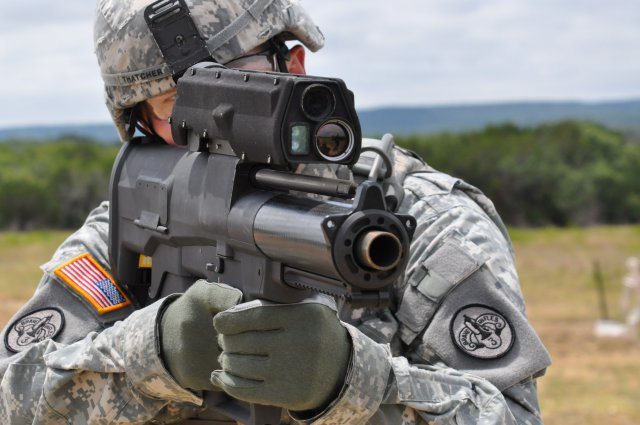Feedback from warfighters in Afghanistan testing the XM25 highlights the lethal effects of the counter-defilade weapon.
“We are getting great feedback from the Soldiers in the field on this weapon. The Soldiers are really excited to keep the weapon system and have requested to keep it longer than we had initially decided to leave those prototypes in theater,” Col. Scott Armstrong, the program manager for Soldier weapons at Program Executive Office Soldier.
During a round table session with PEO Soldier Oct. 6, Armstrong provided an update on the XM25, as well as information on the progress of the individual carbine competition and updates for the M4 carbine to the A1 configuration.
Much of the data collected from the field is anecdotal, providing insight into the Soldier’s experience with the weapon rather than battle damage assessment.
“Operationally there is some very specific feedback that we have been receiving from Soldiers on the capability in the field,” said PEO Soldier Command Sgt. Maj. Bernard C. McPherson. “Rifle-to-rifle contacts where the XM25 is employed are very short. ”
The XM25 has been renamed the Individual Semiautomatic Air Burst System to better represent the capabilities of the weapon.
“The reason we have renamed it is because that is really the materiel solution we have brought to the Army to be able to bridge the gap that was identified as counter-defilade targets,” Armstrong said.
Currently, there are five prototypes being tested by Soldiers in Afghanistan.
“We are hoping to have those in our hands for testing by the end of 2012 and downrange six months later to conduct additional field testing with a battalion size unit,” Armstrong said.
It may be a few years before Soldiers see a new individual carbine rifle, but phase one of the individual carbine competition begins Oct. 27 at Aberdeen Proving Ground.
The first phase is to ensure all of the bids are responsible and responsive from the vendors. The second phase, which runs through 2012, is to initiate the test fires for the program. The third phase takes place in 2013, where three of the rifles will be chosen and will then enter the evaluation phase.
“The third phase is really focused on getting Soldier feedback for the entire test,” Armstrong said.
The winner will be selected based upon best value to the Army followed by a cost benefit analysis which will determine whether it’s appropriate to stay with the current M4A1 or transition the entire fleet to the individual carbine or move to some sort of hybrid solution where the M4A1 is fielded in conjunction with the new individual carbine, Armstrong said.
At the same time the Army tests the individual carbine, there will be continual improvement and upgrade of the M4 carbine to the M4A1 configuration. The M4 improvements can happen one of two ways. First is to purchase the M4A1 configuration directly from the vendor and send them to units. The second method is to provide a kit to units to upgrade the M4 carbines in their inventory to the A1 configuration.
“The Army continues to upgrade all of its equipment in the inventory,” Armstrong said. “The M4 has already had over 60 improvements to that weapon and this is a continuation of that process.”










